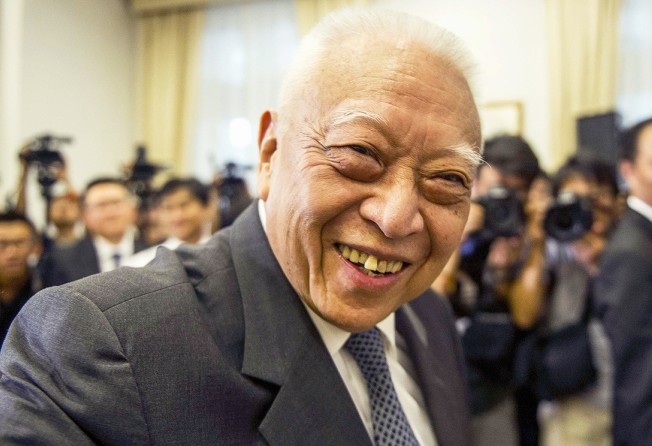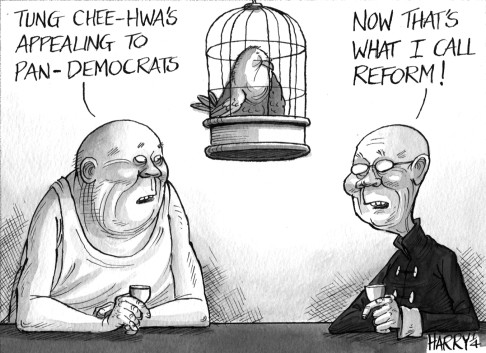Former Hong Kong leader Tung Chee-hwa says 2017 vote will be ‘real’ democracy
Beijing's framework for first one man, one vote election offers 'real and substantial' reform, says former chief executive in call for political unity

- Tung says Hong Kong will usher in a new chapter in history in 2017 written by the people of Hong Kong.
- Welcomes NPC framework, says election method for chief executive could change after 2017
- “I appeal to people of all political stripes to come together and turn negative sentiments into positive energy”
Hong Kong's first chief executive Tung Chee-hwa has called on Hongkongers of "all political stripes" to cast aside their differences and work together to achieve universal suffrage.
The former shipping magnate said it would be democracy "real and substantial" for five million voters in the city to pick their leader in 2017, a claim disputed by critics who say the tougher-than-expected framework set by Beijing will deprive voters of a genuine choice of candidates.
In his first press conference since stepping down as chief executive in March 2005, Tung said it would be a "glittering achievement" for the chief executive to be elected by "one man, one vote" in 2017, 20 years after he was chosen as the city's first leader by a 400-strong selection committee.
"Between 1997 and 2017 - a short span of just 20 years - Hong Kong would have moved from having Britain parachute a governor into Hong Kong to having five million voters choosing their own leader," he said. "We will be ushering Hong Kong into a new chapter in history.
"If we come to a standstill [on constitutional development] this time, I don't know when we can move forward again. That's why I came out today to make the appeal."
His rare comments on Hong Kong's affairs were widely seen as part of Beijing's publicity campaign to defend the decision by the Standing Committee of the National People's Congress on political reform.
Tung's remarks came a day after the last governor, Chris Patten, wrote in the Financial Times that Britain had a "moral and political obligation" to the city because it co-signed the Sino-British Joint Declaration in 1984. "We have a huge stake in the well-being of Hong Kong, with a political system in balance with its economic freedom," Patten wrote.
The framework endorsed by the committee on Sunday allows only two or three candidates to run. They will need approval from the majority of a 1,200-strong nominating committee. Methods for electing the committee, its composition and size will be "in accordance with" those of the election committee that decided the 2012 poll.
All 27 pan-democratic lawmakers vowed on Sunday to veto any government proposal to implement a "one man, one vote" election based on such a model.
During the press conference at the Office of Former Chief Executives, Tung said he noted many pan-democrats reacted with anger and disappointment to the NPC's decision.
"I understand how deeply and strongly felt those emotions are," he said.
But Tung, a vice-chairman of the Chinese People's Political Consultative Conference, said: "Today, on the eve of Hong Kong's crucial development in our long history, on the verge of our going for the biggest political leap, how can we possibly choose to stand still? How can we let our march towards democracy stop and stall?"
Tung, 77, said the framework set down by the Standing Committee was "comparatively conservative" but also comparatively the best, citing the possible constitutional crisis that would be triggered if someone Beijing deemed unacceptable was elected. "If, after 2017, we desire to further improve our democratic system, there is a clear mechanism in the Basic Law for us to do so.
"I appeal to people of all political stripes to come together and turn negative sentiments into positive energy. Hand in hand, we will build a sound electoral arrangement on the basis of the foundation laid down by NPC."
Although he "resolutely opposed" Occupy Central, Tung said he had no doubt that many of those sympathetic towards the civil disobedience movement were patriots and "true-blue Hongkongers at heart".
He did not approve of calls for students to boycott classes. But he believed some were motivated to do so by a love for Hong Kong.
Tung's comments drew criticism, with Joseph Cheng Yu-shek, convenor of the Alliance for True Democracy, saying: "Hong Kong people can't accept a reform model without a democratic element."
Anson Chan Fang On-sang, who served as chief secretary under Tung, said under Beijing's model "it would be impossible for five million voters to have genuine choice", adding: "It would be 100 per cent fake democracy."
